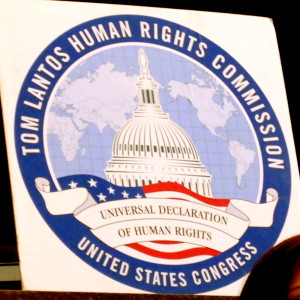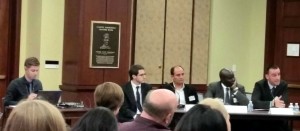
On September 30, 2015, the Tom Lantos Human Rights Commission held a hearing regarding human rights and World Bank lending practices. Three speakers from Ethiopia, Peru, and Kosovo provided case studies about projects funded by the World Bank that infringed upon people’s rights, followed by an impassioned call for change by professor and UN Rapporteur Philip Alston.
Obang Metho, Executive Director of the Solidarity Movement for a New Ethiopia, spoke about land grabs traced back to World Bank loans through investigations by the Oakland Institute. After inspecting the situation, the World Bank admitted to violating its own policies. What happened next? Nothing, according to Metho. Not only were the violations not addressed, but shortly thereafter the World Bank loaned over $300 million to Ethiopia, where, Metho explained, journalists get jailed and the government is not transparent enough to be held accountable for possible corruption. He implored Congress to ensure that the World Bank follows through with its own policies in practice, striking an emotional chord with his story: “To me, the land is my identity, my culture, my values… it’s not a land grab, it is a life grab.” His story detailed a World Bank that is failing to live up to its values to empower and give voice to people who do not otherwise have a voice.
 The second witness was Milton Sanchez, General Secretary for the Interinstitutional Platform of Celendin. He spoke against the Conga mining project in Peru, partly funded by the International Finance Corporation (IFC). The project will destroy four Andean mountain lakes and cause irreversible damage to an ecosystem that surrounding communities rely upon for their livelihoods. Despite this, the IFC failed to conduct more assessments to make sure the project complies with their own standards. Sanchez said that in response to submissions to the World Bank, the Peruvian government, and Newmont Mining Company, all the community has received is “the militarization of our cities” and “the criminalization of our protests,” referring to protests during which five people were allegedly shot and killed by Peruvian police.
The second witness was Milton Sanchez, General Secretary for the Interinstitutional Platform of Celendin. He spoke against the Conga mining project in Peru, partly funded by the International Finance Corporation (IFC). The project will destroy four Andean mountain lakes and cause irreversible damage to an ecosystem that surrounding communities rely upon for their livelihoods. Despite this, the IFC failed to conduct more assessments to make sure the project complies with their own standards. Sanchez said that in response to submissions to the World Bank, the Peruvian government, and Newmont Mining Company, all the community has received is “the militarization of our cities” and “the criminalization of our protests,” referring to protests during which five people were allegedly shot and killed by Peruvian police.
Nezir Sinani, Safeguards and Climate Change Coordinator at the Bank Information Center, closed out the first panel highlighting a case that is eleven years in the making. Forced evictions for a new coal-burning power plant in Kosovo were deemed unacceptable in 2004, but at least 22 families were already displaced, and over ten years later the affected Kosovo community still lives in limbo, unsure when the project will be approved and possibly displace them, too. It took the World Bank nine years to help the government in Kosovo develop a resettlement legislative framework, but even this framework is not in line with the Bank’s own Resettlement Action Plans. Sinani also pointed out that the World Bank did not properly consider alternatives to the power plant project. Kosovo already depends on coal for 97% of its electricity. It should be transforming its energy generation to cleaner sources, not approving another coal-fired power plant. Sinani concluded by asserting that the problem with the World Bank is systemic.
 The speaker for the second half of the hearing, Professor and UN Special Rapporteur on extreme poverty and human rights, Philip Alston, heartily echoed this conclusion. As Alston highlighted in his latest report to the UN, the World Bank is a “human-rights free zone” due to its unnecessary, anachronistic compliance with a 1945 political prohibition document. Even though most countries now support integrating human rights frameworks into development work, the World Bank continues to live in the past.
The speaker for the second half of the hearing, Professor and UN Special Rapporteur on extreme poverty and human rights, Philip Alston, heartily echoed this conclusion. As Alston highlighted in his latest report to the UN, the World Bank is a “human-rights free zone” due to its unnecessary, anachronistic compliance with a 1945 political prohibition document. Even though most countries now support integrating human rights frameworks into development work, the World Bank continues to live in the past.
Alston explained that international human rights safeguards are described as “aspirations” rather than obligations (the word “aspirations” was repeated by the UN Special Rapporteur with frustrated incredulity). He emphasized the crucial, empowering distinction between telling individuals in a country, “We will do everything we can to help you receive an education” versus telling those same individuals, “You have a right to an education.” Alston urged Congress to help the World Bank fulfill its potential to do immense good, and to prevent disasters such as those that have occurred in Ethiopia, Peru, and Kosovo, by pushing it to adopt an effective and operational human rights framework.
Originally posted on October 6, 2015
——————————————————————————————————————–
Read previous posts about the Tom Lantos Human Rights Commission.
